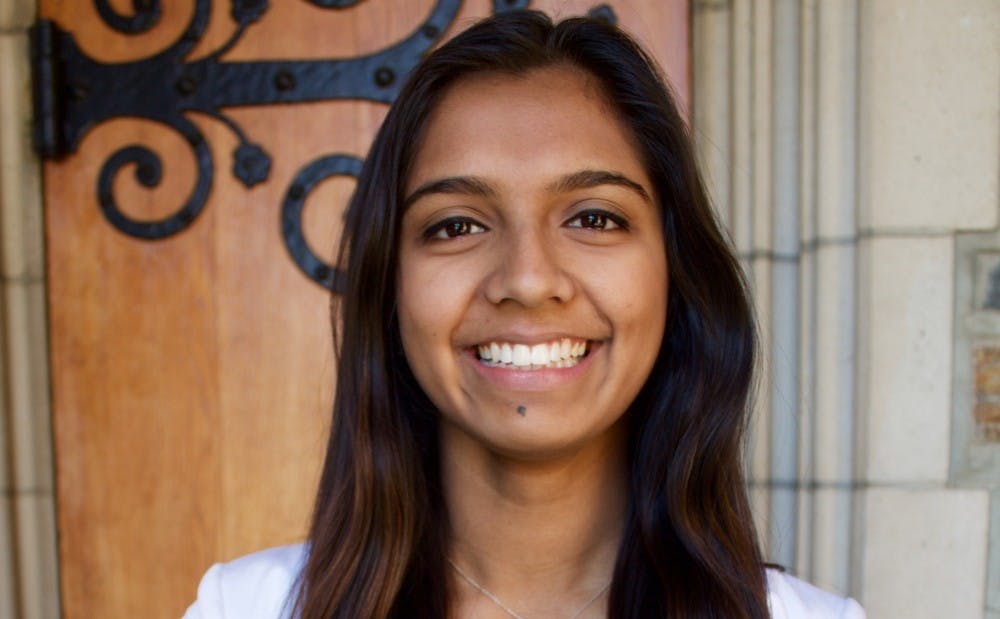The Chronicle spoke with senior Riyanka Ganguly to reflect on her term as Duke Student Government president. Ganguly gave advice for president-elect Kristina Smith, a junior, including how DSG can serve as a bridge between students and the administration. This interview has been edited for clarity and length.
The Chronicle: What have you learned the most as president?
Riyanka Ganguly: I’ve learned most the extent to which administration takes into account our decisions as students, and the power we have if we choose to speak up. I’ve always been pleasantly surprised by the ease of access to administration given my role [as DSG president]. I’ve also been pleasantly surprised by how willing the administration are to meet with students, and to communicate and take into account our opinions.
For any big decision, there’s a student representative or a student voice [present], and I think that’s really important. After going to conferences with other student body presidents across the nation, I’ve realized that not all schools have that, so I’m much more appreciative of Duke and of the power that students have to enact change.
TC: If you had one main critique of what happened this year, what would it be, and how might it change going forward?
RG: We could do more in terms of communicating what we’re doing to the general student body. That’s something I’ve tried to focus on this year, and why I’ve focused a lot on the website and the DSG blast. I hope that the next DSG administration [continues to] focus on that because at the end of the day, I know [DSG] is doing a lot, but…students don’t know about it.
TC: Was it your idea to redesign the DSG weekly email?
RG: [We made] a conscious decision to revamp [the email]. I wrote every email, and I added my own humor and jokes to it, but it was a very strategic effort by the communications team. [We] tried to think of ways to spread the news of what we do in more approachable ways.
TC: Is there anything about where DSG is right now that worries you for the coming year?
RG: I think DSG can do a lot better about being a bridge to the administration—to communicate with students what the administration is thinking and doing and to better facilitate dialogue. It has always surprised me how easy it is to connect with administration, but I understand the barriers in place that make it intimidating [for students], and that’s why [DSG] is there.
TC: Given the recent alumni weekend protest, could you further comment on how DSG can serve as a bridge to connect students and the administration?
RG: We’ve been in communication with students and administration. I think in order to be a bridge we need to listen to both sides…Being that bridge requires the patience to listen to both sides. This protest raised a lot of valid concerns. In order for us to be that bridge, we need to show our dedication to those demands and to show what has already been done to [meet those demands]…We have been against any disciplinary conduct against the students…Our hope is that both sides are willing to engage in dialogue.
TC: What was the hardest thing for you as DSG president, professionally or personally?
RG: It really challenged the way in which I approached problems and issues. Personally, I am no longer pre-med because of being DSG president, I actually decided to quit this semester. Personally, I recognize the value in understanding how policy worked or how budgets work, and a lot of the time, I felt that I was ill-prepared in how to structure my arguments.
For example, I had a lot of passion for an idea, but I didn’t think through the policy implications of it, how it would hold up in court or how the finances would work. These are the questions that anyone asks before investing in anything…I had to figure out how to speak the language to make [my ideas] more effective…how to phrase it and how to sell it. That has been the hardest part for me.
Another thing is that at the end of the day, it’s very difficult to please everyone. I’ve gotten so many responses from the [email] blast, but sometimes people forget it’s a person behind the blast…Learning how to balance both positive and negative feedback in productive manners is something that I’ve personally learned as well.
TC: What advice do you have for DSG president-elect Kristina Smith?
RG: I would [tell her to] learn to not take things personally. Approach everything with an open mind, and realize that even though at first something may seem obviously wrong…it requires patience to delve into the issue. At the end of the day, you do have to represent all students—not just a minority of students, not just the majority of students. In order to do that, it takes a lot of patience to do the due diligence of talking to everyone.
Also, remember to just have fun with it! Put your humor into it…The DSG blasts are one of the few times in the week when I’m 100 percent me—that’s all my humor, it’s how I talk [and] how I think.
TC: Do you have any last words you want to say to the undergraduate student body?
RG: We have a lot of passion at Duke, and we have a lot of good people. But I don’t think we have enough faith in each other, and I don’t think there’s enough facilitated dialogue. We are very quick to dismiss anyone and everyone…We are not making a conscious effort to be friends with each other. If one of our friends shared an opinion with us, we [would] have more patience for them, and we [would] believe them.
Get The Chronicle straight to your inbox
Signup for our weekly newsletter. Cancel at any time.

